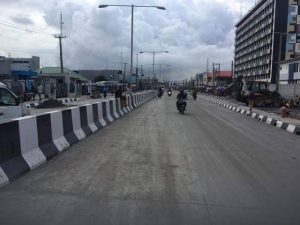At last, the decade-long intractable bedlam associated with the gridlocks in Apapa, Lagos, which harbours the nation’s biggest premier ports – Apapa and the Tin-Can Island Ports – has been broken off with sanity and order restored.
The streets and the roads in and out of the hitherto serene and well-laid out area built by the colonial masters which served as officials’ residentiary and homes for the privileged in the 1950s, had been gridlocked by articulated vehicles including petrol tankers and container-laden trucks.
The Apapa gridlock has affected all parts of Lagos causing horrendous traffic on major highways of Lagos-Ikorodu, Oshodi-Apapa, Oshodi-Ikeja-Sango-Ota and Orile-Mile 2-Badagry among others.
Recreational and health facilities are provided including a boat club located on Apapa Creeks.
Nigerians including businessmen and investors get stuck for hours or sometimes a whole day in the traffic snarls with millions of naira and man-hours lost in a COVID-19 ravaged economy.
For more than three years, the take-over of traffic management from the Presidential Task Team on the decongestion of Apapa gridlock made no impact as the gridlock grew worse.

However, the intervention of the Nigerian Ports Authority (NPA) which announced the commencement of ETO — the Electronic Truck call-up system has freed the Apapa axis and major road arteries in the metropolis.
However, normalcy returned to Apapa following the removal of trucks that littered the port access roads – Apapa Oshodi Express Way and Western Avenue leading to Ijora.
The NPA initiative is designed for the management of truck movement and access to and from the Lagos Ports Complex and the Tin-Can Island Ports.
By the NPA solution, traversing the length and breadth of Lagos has become easier, less stressful, faster and unhurried.
Persecondnews spoke to a cross-section of Lagosians and motorists about their latest ease of movement since the introduction of NPA’s ETO with majority of them lauding the initiative.
A motorist, Mr Odunayo Olumide, who came into Lagos from Abuja dreading movement in the city, was full of kudos for the Managing Director of NPA, Hadiza Bala Usman under whose leadership the agency rolled out ETO.
He said driving from FESTAC to Ikeja and Lagos Island through Ikorodu road was accomplished within three hours which usually takes several hours if not the whole day.
“I think the NPA boss deserves commendation for the bold step and solution to the nagging and nastiest gridlocks in the city caused by the Apapa lockdown.
“I give kudos for her, she has done the impossible,’’ Olumide said.
Another respondent, Mr Adeleye Ajayi, the Chairman, Nigeria Union of Journalists (NUJ), Lagos State Council, told Persecondnews about his experience plying the major roads in the metropolis since the decongestion of Apapa.
“It will facilitate things generally; the turnaround time will be faster now. Trucks can move in and out faster than before when it usually takes several days and weeks to get to the ports.
“The call-up system will also reduce the cost of moving containers which had gone up to about 200 per cent. Now it has started going down,’’ Ajayi, a one-time President of Maritime Reporters Association of Nigeria (MARAN) and Deputy Editor-in-Chief, News Agency of Nigeria (NAN).
He noted with satisfaction that roads in the metropolis are now freer and overhead bridges relieved of the weight of the tankers and trucks who park on them for several days while in the queue to get to Apapa.
“The situation is being ameloriated while trade is being boosted by the new system.
“Again, there will be more revenue for federal, state and local governments particularly the Nigeria Customs Service and NPA,’’ Persecondnews quotes the NUJ chairman as saying.
A Customs Clearing Agent, Peter Okonkwo, also expressed joy over the free flow of traffic into and out of the Apapa ports, describing NPA’s call-up system as a magic wand.
“We had lost hope that Apapa can never be decongested in our life time. We thank the NPA and the stakeholders for sustaining it.’’
More than 7,000 trucks have been certified for the digitalized call-up system, it was learnt.
Both the Vice-Chairman, National Association of Road Transport Owners (NARTO), Dry Cargo Section, Alhaji Abdullahi Inuwa, and the National Vice-President, Association of Nigerian Licensed Customs Agents (ANLCA), Mr Kayode Farinto, expressed laudatory remarks about the innovation.
They believed that it would put an end to gridlocks on Apapa roads but want the access roads to be repaired and made motorable.
For Inuwa, “the motive is to take trucks off the roads, but NPA should involve other garages where trucks are parked in order to successfully decongest the roads.”
Explaining the modalities for ETO’s operation, Mr Ibrahim Nasiru, NPA’s Assistant General Manager, Corporate and Strategic Communications, said all trucks doing business at the ports will be required to park at the approved truck parks until they are called up into the port through the ETO application.
The application will be responsible for the scheduling, entry and exit of all trucks into the ports with effect from February 27, 2021.
He said: “All transporters, trucks owners and truck drivers will be required to download the ETO App from Google play store or sign up at http://eto.ttp.com.ng before the commencement date to enable them to register accordingly.’’
In addition, cargo owners can only return empty containers to the ports through the approved holding bays of shipping companies using the ETO Platform.
Nasiru said: “It is the responsibility of the shipping company to move empty containers from their holding bay to the port. All cargo owners have to do is drop their empty containers at the holding bay of the shipping company. The shipping company will then make the necessary bookings on the Eto platform to return empty containers to the port.
“The management of the NPA solicits the cooperation of transporters, truck drivers, cargo owners, clearing agents shipping companies and all port users in the implementation of the project, which will bring order and sanity to the ports access roads.”
The AGM warned that non-compliance to the use of ETO and its guidelines will result in denial of access into ports, impounding of trucks and withdrawal of registration/operating licence.
However, going down the memory lane and according to Wikipedia, far back in 1926, when the deepwater berths of Apapa quays were completed, it was envisioned that a large amount of traffic would be by rail.
But as the Apapa Port Complex also known as the Lagos Port Complex being the country’s largest and busiest port grew and trucks became the preferred means of transporting goods to and from the port, traffic gridlock caused by trucks parking on the roadside became a common feature and daily occurrence.
The port is used for exporting agricultural produce from the provinces of Western and Northern Nigeria in the late 1920s and in 2005, the complex was divided into terminals and concession to private operators with the NPA acting as the “landlord and regulator’’.
For any infraction, the Lagos State Government and the NPA taskforce have stationed tow vehicles in strategic locations to remove erring trucks.
Meanwhile, Lagos State Gov. Babajide Sanwo-Olu, has inaugurated a Special Traffic Management and Enforcement Compliance Team for Apapa.

He also restated the government’s zero tolerance for traffic offences in the state particularly in the Apapa axis.
The team included Mr Toyin Fayinka (Special Adviser to the Governor on Transportation), Mr Olajide Oduyoye (General Manager, Lagos State Traffic Management Authority (LASTMA), Mr Sola Giwa (Senior Special Assistant to the Governor on Central Business Districts) and Mr Ayodeji Laurent, SSA on Political Security Intelligence.
“The Special Traffic Management and Enforcement Compliance Team is saddled with the responsibility of ensuring a seamless traffic management system specifically designed to restore sanity in and around Apapa.
“They are to create a cohesive system that would aid the resurgence of business activities and ensure that residents live in a conducive environment devoid of traffic-induced stress,´´the governor said in a statement by the Commissioner for Information and Strategy, Mr Gbenga Omotoso and given to Persecondnews.
The areas of coverage of the team’s operations include Ikorodu Road to Oshodi – Mile 2 – Apapa, Ikorodu Road – Funsho Williams Avenue (Surulere) – Alaka – Iganmu – SIFAX – Ijora 7up – Apapa.
He said that the Policemen from Area ‘B’ Police Command would tentatively provide security back-up for the team, pending the announcement of the new security architecture by the state government.
The governor’s action followed his Dec. 28, 2020, visit to Apapa and his pronouncement on the takeover of traffic management from the Presidential Task Team on the decongestion of Apapa gridlock.
The head of the new Special Traffic Management and Enforcement Compliance Team is Fayinka; other members are expected to work with the designated team of the Inspector-General of Police and collaborate with the State Police Commissioner, Hakeem Odumosu, and other members of the law enforcement agencies in and around Apapa.























Leave a comment